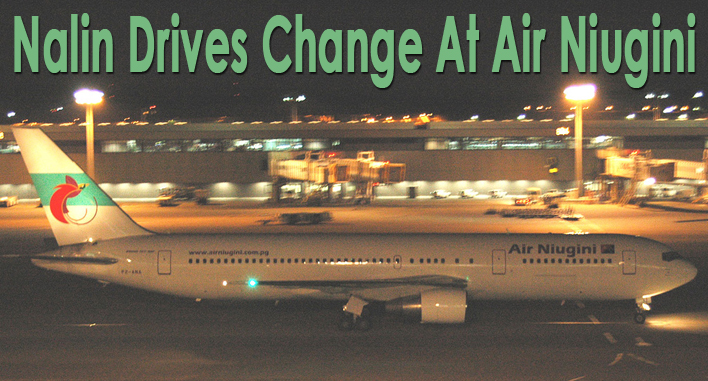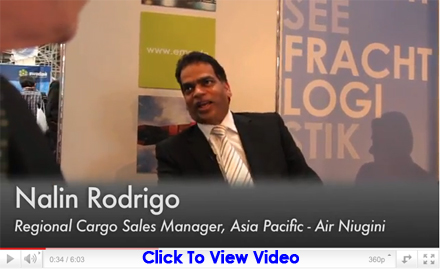
 Nalin
Rodrigo, Regional Cargo Sales Manager, Asia Pacific – Air Niugini,
was present at Air Cargo Europe 2011 in Munich to discuss his new charge,
Air Niugini. Nalin
Rodrigo, Regional Cargo Sales Manager, Asia Pacific – Air Niugini,
was present at Air Cargo Europe 2011 in Munich to discuss his new charge,
Air Niugini.
Air Niugini is the national airline of
Papua New Guinea. Having been in Papua New Guinea for some time, Mr.
Rodrigo calls this “an exciting time” for the country, which
hails as one of the most culturally diverse on the planet.
“It is quite fortunate that I met
you today; the whole country is booming because of an American investment
by Exxon Mobil,” said Mr. Rodrigo.
Exxon Mobil is the lead operator of the
liquid natural gas project, which has been underway in Papua New Guinea
for almost a year.
“It is changing the whole face of
the country, so that is probably why I was recruited by Air Niugini
as well,” said Mr. Rodrigo.
The new revenue from Exxon Mobil is expected
to bring Papua New Guinea $30 billion over the next thirty years and
will more than double its gross national product. We have to think the
direct impact on Air Niugini will be in personnel, equipment and a revitalization
of the industry.
“We added a new 767, mainly to bring
in workers for the project from Asia – a lot of Filipinos and
Chinese come to work for this project.
“On the freight side, we will have
tons and tons of equipment coming for the project, but these are not
carried on passenger aircraft.
“These are massive pieces, which
will require An-124s.
“We are in partnership with another
chart operator for freight we cannot bring.
“We are also in partnership with
EMO Trans,” said Mr. Rodrigo.
EMO Trans was chosen for its joint venture
with GAC Energy & Marine Services LLC (GEMS). Located in Texas near
Houston International Airport, the GEMS facility boasts a total of 105,000
square feet of storage space – 65,000 square feet in warehousing
space and 40,000 square feet of open-air storage. GEMS offers services
for the oil and gas and mining sectors, which include international
or domestic air and ocean freight management, in-house case packing,
and charter and project services.
“GEMS is primarily into oil and
gas, so we will be working closely with them for this project,”
said Mr. Rodrigo.
Currently, cargo is not a very big business
for Papua New Guinea, but perhaps that is why Mr. Rodrigo is there.
“We are in a growth stage.
“Air Niugini Cargo is an infant.
So it is now growing into a boy, and then probably to an adult in a
short time.
“We have had our ups and downs,
but right now it is a very exciting time,” said Mr. Rodrigo.
Nalin Rodrigo has had a history in the
air cargo industry.
We recall walking into the early, bright
dawn of Bandaranaike International Airport and through the mass of people
going off to work at the clothing factories that line the route into
downtown Colombo Sri-Lanka.
We had just met this engaging and energetic
native of that island nation over a couple beers up on Dubai Creek,
when EK owned a slice of Sri Lankan Airways and Nalin was UL air cargo
manager.
Peter Hill had moved from his pub where
he pulled pints to become UL CEO, where he worked pushing back a growing
fleet.
Today, Peter is in Muscat and Nalin, an
inventive, engaging and thoroughly nice guy is off on a new adventure
in Papua.
With his past experiences, we wonder if
anything has surprised him regarding this new position with Air Niugini.
“With other airlines, you work with
one culture, mainly in the hub.
“With Air Niugini, you have 800
different types of people who come and work.
“Though they are all nationals of
that nation, they are all different sects.
“They all have different ways of
looking at things,” concluded Mr. Rodrigo.
There are actually 850 indigenous languages
spoken in Papua New Guinea, with a population of roughly only 7 million
people. The majority of people living in Papua New Guinea are in traditional
communities that continue to farm the land themselves. The nation’s
constitution has actually included their preservation in its framework
in the interest of maintaining a distinct cultural identity.
The biggest challenge, Nalin feels, is
getting everyone on the same page.
But with Air Niugini leaving its infancy
to stand on new legs, we can rest assured that progress is just a few
baby steps away.
Geoffrey Arend/Flossie
|


![]() 100%
Green
100%
Green